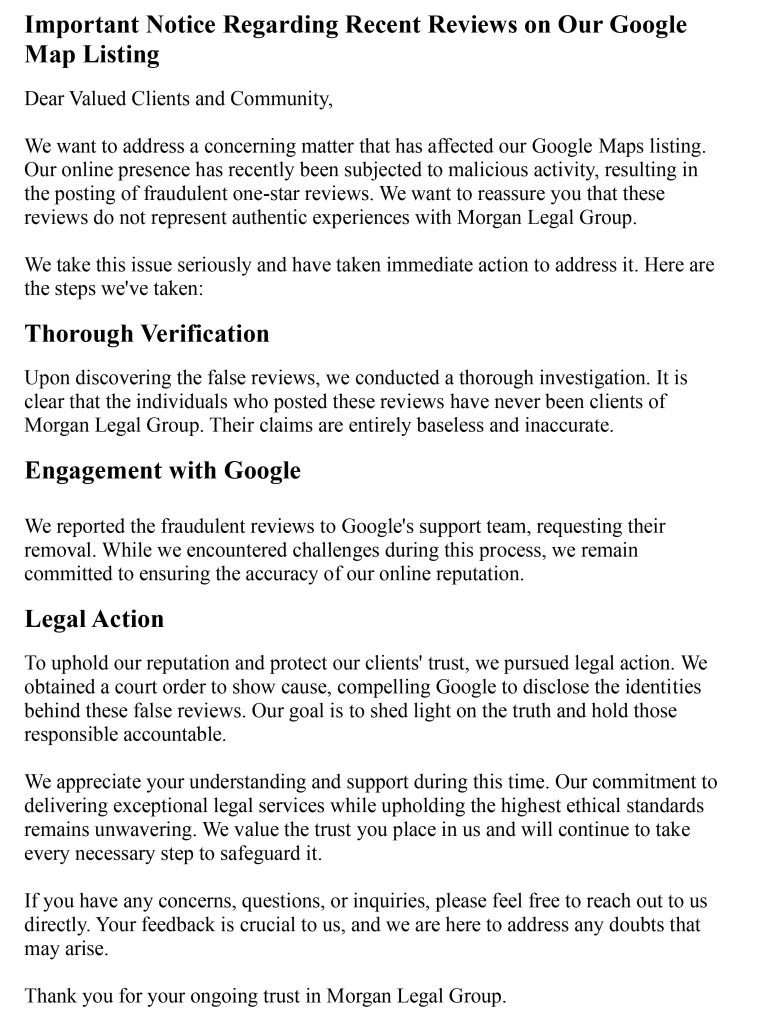Estate Planning at Different Ages
At Morgan Legal Group, located in New York City, we specialize in estate planning, probate, guardianship, elder law, wills, and trusts. Estate planning is a critical aspect of financial management that evolves with each stage of life. Whether you are just starting your career, raising a family, or enjoying retirement, your estate planning needs will change over time. This guide will provide insights into estate planning at different ages, ensuring your plan is comprehensive and effective under New York State law.
Estate Planning in Your 20s and 30s
In your 20s and 30s, estate planning might not seem like a priority, but starting early can provide significant benefits. At this stage, your primary focus should be on the foundational elements of an estate plan.
Creating a Will
A will is a fundamental component of any estate plan. It allows you to specify how your assets should be distributed after your death and appoint guardians for minor children. Even if you have limited assets, having a will ensures that your wishes are honored.
Designating Beneficiaries
Ensure that you have designated beneficiaries for your bank accounts, retirement plans, and life insurance policies. This can help streamline the transfer of assets and avoid probate for these accounts.
Establishing Powers of Attorney
Appoint a trusted individual to make financial and healthcare decisions on your behalf if you become incapacitated. Powers of attorney are crucial for ensuring your affairs are managed according to your wishes.
Estate Planning in Your 40s and 50s
During your 40s and 50s, you are likely to have more assets and responsibilities. This is a critical time to review and update your estate plan to reflect your current circumstances.
Updating Your Will
Review and update your will to account for changes in your family structure, such as marriage, divorce, or the birth of children. Ensure that your assets are distributed according to your current wishes.
Creating a Trust
Consider establishing a trust to manage your assets more effectively. Trusts can provide benefits such as avoiding probate, minimizing estate taxes, and protecting assets for your beneficiaries.
Planning for Long-Term Care
Start planning for potential long-term care needs. Consider purchasing long-term care insurance and exploring options for protecting your assets from nursing home costs.
Estate Planning in Your 60s and Beyond
As you approach retirement and beyond, your estate planning needs will shift towards preserving your wealth and ensuring your wishes are clearly defined.
Finalizing Retirement Plans
Ensure that your retirement accounts and pensions are properly designated to your beneficiaries. Review your retirement income sources and make any necessary adjustments to your estate plan.
Advanced Healthcare Directives
Update your healthcare directives, including a living will and healthcare proxy. These documents outline your medical care preferences and appoint someone to make healthcare decisions if you are unable to do so.
Charitable Giving
If you have philanthropic goals, consider incorporating charitable giving into your estate plan. This can include setting up charitable trusts or making bequests to your favorite organizations.
Common Estate Planning Mistakes to Avoid
Regardless of your age, there are common estate planning mistakes that you should avoid to ensure your plan is effective.
Not Having an Estate Plan
One of the biggest mistakes is not having an estate plan at all. Without a plan, your assets will be distributed according to New York State’s intestacy laws, which may not align with your wishes.
Failing to Update Your Plan
Life changes, and so should your estate plan. Regularly review and update your plan to reflect changes in your personal and financial circumstances.
Ignoring Digital Assets
In today’s digital age, it’s essential to include provisions for your digital assets, such as online accounts and cryptocurrencies, in your estate plan.
Overlooking Tax Implications
Ignoring the tax implications of your estate plan can lead to a larger tax burden for your beneficiaries. Work with an experienced attorney to develop strategies for minimizing estate taxes.
How Morgan Legal Group Can Help
At Morgan Legal Group, we are dedicated to providing personalized and comprehensive estate planning services tailored to your unique needs and circumstances. Our experienced attorneys are here to guide you through every stage of life, ensuring that your estate plan is effective and compliant with New York State law.
Personalized Legal Advice
We take the time to understand your goals and develop a customized estate plan that meets your needs. Our personalized approach ensures that your plan reflects your wishes and protects your interests.
Expert Guidance
Our team of experienced attorneys has a deep understanding of New York State law and a proven track record of success in estate planning. We provide expert guidance to help you navigate the complexities of estate planning and make informed decisions.
Comprehensive Services
From drafting wills and trusts to managing probate and guardianship matters, we offer a wide range of services to address all aspects of estate planning. Our goal is to provide you with a seamless and stress-free experience.
Contact Us
If you are in need of estate planning services, contact Morgan Legal Group today. Our experienced attorneys are here to provide you with the expert legal assistance you need. Schedule a consultation with us and take the first step towards securing your future and protecting your loved ones.
Frequently Asked Questions
Why is estate planning important at different stages of life?
Estate planning is important at every stage of life because your financial and personal circumstances change over time. Starting early and updating your plan regularly ensures that your assets are protected and your wishes are honored.
What should I include in my estate plan?
Your estate plan should include a will, powers of attorney, healthcare directives, and provisions for managing and distributing your assets. Depending on your circumstances, you may also want to include trusts and long-term care planning.
How often should I update my estate plan?
You should review and update your estate plan regularly, especially after significant life events such as marriage, divorce, the birth of a child, or the acquisition of new assets.
Can Morgan Legal Group help with digital assets?
Yes, we can help you include provisions for your digital assets in your estate plan. This ensures that your online accounts and cryptocurrencies are managed and distributed according to your wishes.
How do I schedule a consultation with Morgan Legal Group?
To schedule a consultation with Morgan Legal Group, contact us through our website or call our office. Our team is ready to assist you with your estate planning needs and provide you with the expert guidance you require.
































